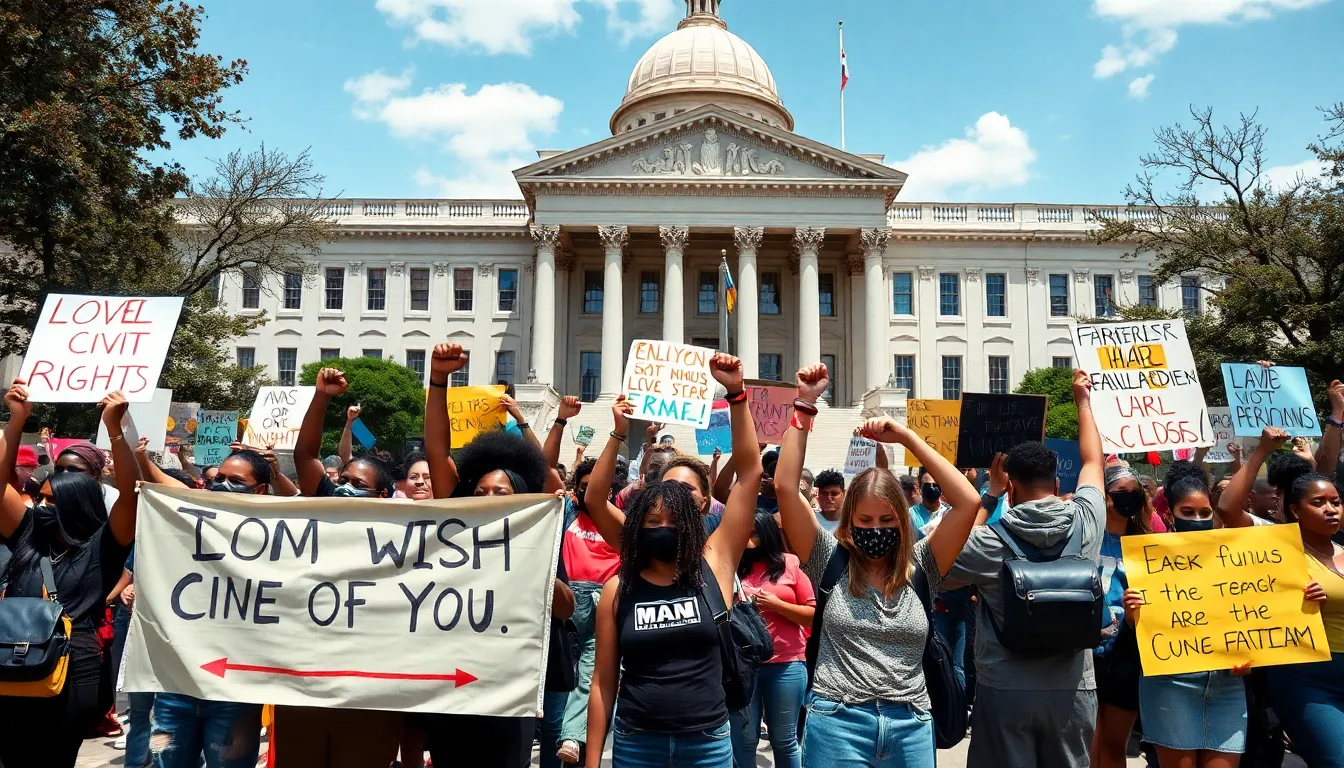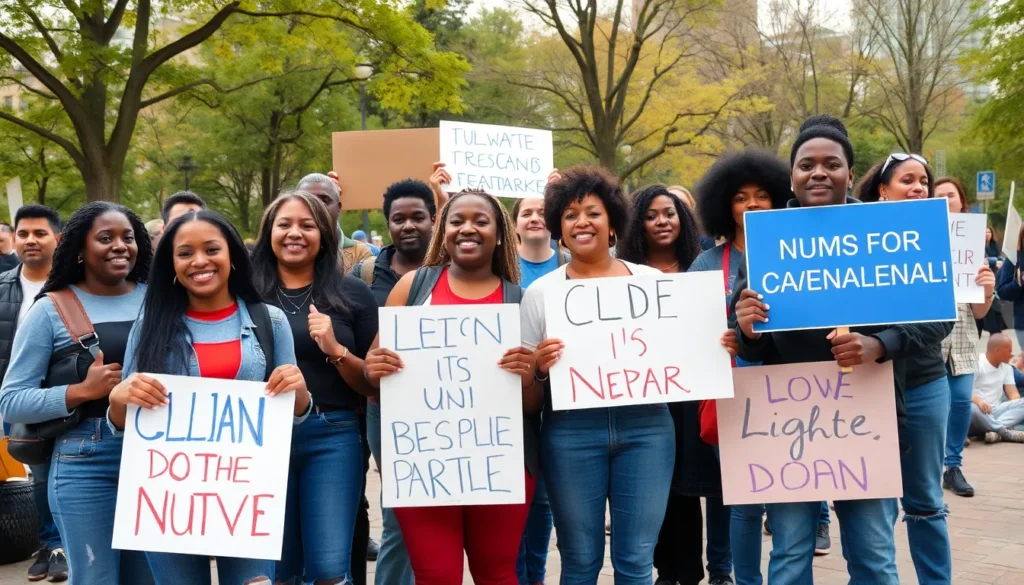In a world where civil and political rights often feel like a game of whack-a-mole, staying informed is more crucial than ever. With new developments popping up faster than a cat meme on social media, it’s easy to get lost in the chaos. But fear not! This article dives into the latest headlines that matter, serving up the facts with a side of wit.
Table of Contents
ToggleOverview of Civil and Political Rights
Civil and political rights encompass a range of fundamental freedoms essential for individual dignity and governmental accountability. They include the right to free speech, the right to vote, and the right to assemble peacefully. International agreements, like the International Covenant on Civil and Political Rights (ICCPR), serve to protect these rights globally.
Legislation often varies by country, reflecting distinct cultural values and governance styles. For instance, some nations prioritize freedom of expression, while others impose restrictions in the name of national security. Each approach influences how citizens access rights and protections.
Recent developments highlight ongoing challenges to civil and political rights. Activists across various sectors raise awareness about issues such as election integrity and freedom of the press. Countries like Belarus and Myanmar face scrutiny for their handling of political dissent, leading to widespread protests and international condemnation.
Monitoring organizations play an important role by documenting abuses and advocating for reform. Organizations such as Human Rights Watch and Amnesty International provide valuable resources, helping citizens understand their rights and mobilize for change. Their reports often illuminate patterns of oppression and encourage dialogue among affected communities.
Maintaining awareness of these rights remains crucial, particularly as governments evolve. Recent trends indicate a rise in both authoritarianism and grassroots movements aimed at protecting freedoms. Citizens who remain informed contribute significantly to upholding democracy and justice within their nations.
Recent Developments in Civil Rights

Significant developments continue to shape the landscape of civil rights. Staying updated on these changes is essential for understanding the current state of freedoms worldwide.
Key Legislative Changes
Legislation in various countries reflects shifting attitudes towards civil rights. In 2023, several states in the U.S. enacted new voting laws aimed at expanding access, including automatic voter registration and extended early voting periods. Countries like Canada introduced protections for marginalized communities, strengthening anti-discrimination laws. Meanwhile, emerging laws in Europe emphasize digital privacy rights, ensuring citizens’ data remains secure. These changes signal a proactive approach to safeguarding civil rights, indicating a commitment to inclusivity and equality.
Landmark Court Cases
Recent court cases have set significant precedents in civil rights law. In the U.S., a decision regarding voting access confirmed the protection of mail-in ballots, a critical development for ensuring equitable participation. Similarly, a landmark ruling in a European court reinforced the right to protest, highlighting protections for freedom of assembly. Other rulings worldwide addressed cases of discrimination, showcasing judicial systems’ role in combating injustice. Each case advances the conversation around civil rights, fostering an environment for reform and enhanced accountability.
Updates on Political Rights
Recent developments in political rights highlight ongoing discussions, especially concerning electoral reforms and freedom of speech.
Electoral Reforms
Countries are advancing electoral reforms to enhance voting access. In the United States, several states implemented new legislation promoting early voting options. These changes aim to simplify registration processes and expand mail-in ballot availability. Some nations, such as Canada, are introducing measures to protect marginalized communities against voter suppression. Notably, reform efforts focus on tackling gerrymandering, ensuring fair representation. International pressure often influences these reforms, with organizations advocating for transparent electoral processes. These initiatives reflect an increasing commitment to safeguarding democratic practices globally.
Freedom of Speech and Expression
Freedom of speech remains under threat in numerous regions. Recent incidents in Belarus and Myanmar illustrate serious constraints on dissent. Activists persist in calling for improved press freedoms amid growing governmental restrictions. Social media platforms emerge as vital tools for mobilization, yet they face scrutiny regarding censorship. Countries are witnessing significant pushback from citizens demanding greater transparency and accountability. Legislative changes are happening in various nations, reaffirming the necessity of protecting free expression. Public outcry often accompanies these violations, exemplifying the global movement to uphold democratic rights.
Global Perspectives on Civil and Political Rights
Civil and political rights vary significantly across the globe, reflecting cultural values and governance structures. Understanding these differences is crucial for recognizing the broader implications on democracy.
Regional Highlights
North America sees significant advancements in civil rights, particularly regarding voting access. States like California and New York implemented measures for early voting and mail-in ballots to enhance participation. In Europe, nations such as Germany and France advocate for digital privacy rights, responding to growing concerns about data protection. Africa faces a complex landscape, with countries like South Africa making strides in civil rights while others struggle with political repression. In Asia, India’s ongoing debates about freedom of expression highlight the tension between democratic aspirations and governmental control.
Impact of International Treaties
International treaties, such as the International Covenant on Civil and Political Rights (ICCPR), set a global standard for protecting rights. Implementation of these treaties varies, demonstrating regional differences in commitment levels. Countries that ratify the ICCPR commit to uphold civil and political rights, yet compliance often falls short. Regular reporting and scrutiny from organizations like Amnesty International hold nations accountable, revealing abuses and inequities. Enhanced awareness of treaty obligations encourages advocacy and reform efforts worldwide, reinforcing the global commitment to human dignity.
Emerging Trends in Civil and Political Rights Advocacy
In recent years, civil and political rights advocacy has evolved significantly. Organizations now leverage digital platforms for mobilization and awareness campaigns, enabling rapid communication across borders. Young activists often spearhead these movements, harnessing social media to amplify their voices and share grassroots experiences.
Data reveals a surge in participation at protests for various causes, ranging from climate action to racial equality. Many grassroots movements emphasize intersectionality, recognizing the interconnectedness of diverse issues affecting marginalized communities. Advocates increasingly collaborate internationally, exchanging strategies and learning from each other’s successes in order to strengthen campaigns.
Technological advancements also play a critical role in shaping advocacy strategies. Encrypted messaging apps facilitate secure communication among activists, protecting them from surveillance and persecution. Emerging technologies like blockchain are utilized to enhance transparency in electoral processes and protect voter data.
Legislation is undergoing changes at an unprecedented pace, reflecting societal shifts. Countries, such as Canada and several U.S. states, introduce new laws aimed at expanding voting access. Europe’s focus on digital privacy rights demonstrates a growing awareness of protecting citizens against online abuses.
As the global landscape shifts, younger generations seek to redefine civic engagement, emphasizing local actions with global implications. The importance of mental health within activism is gaining traction, with organizations promoting self-care practices amidst challenging environments.
Ultimately, the landscape of civil and political rights advocacy remains dynamic, signaling shifting priorities and innovative strategies that adapt to contemporary challenges. Observing these trends offers insight into the evolving nature of rights protection across various contexts and regions.
Staying informed about civil and political rights is crucial in today’s fast-paced world. The landscape is constantly evolving with new challenges and opportunities for advocacy. As activists leverage technology to promote awareness and mobilize support, the fight for fundamental freedoms remains at the forefront of global discourse.
Legislative changes across various regions reflect shifting attitudes toward civil rights, reinforcing the importance of accountability and transparency. With organizations like Human Rights Watch and Amnesty International documenting abuses, there’s hope for progress in safeguarding individual dignity.
While challenges persist, the commitment to uphold civil and political rights continues to inspire action. The world watches as citizens advocate for their rights, proving that the pursuit of justice and equality is a collective effort that transcends borders.





